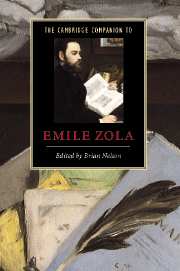Book contents
- Frontmatter
- 1 Zola and the nineteenth century
- 2 Family histories and family plots
- 3 Zola and the representation of society
- 4 Questions of sexuality and gender
- 5 Zola and contemporary painting
- 6 Zola and the art of fiction
- 7 Thérèse Raquin: animal passion and the brutality of reading
- 8 Nana: the world, the flesh and the devil
- 9 Germinal: the gathering storm
- 10 La Bête humaine: Zola and the poetics of the unconscious
- 11 Zola’s utopias
- 12 ‘J’accuse...!’: Zola and the Dreyfus Affair
- Further reading
- Index
1 - Zola and the nineteenth century
Published online by Cambridge University Press: 28 May 2007
- Frontmatter
- 1 Zola and the nineteenth century
- 2 Family histories and family plots
- 3 Zola and the representation of society
- 4 Questions of sexuality and gender
- 5 Zola and contemporary painting
- 6 Zola and the art of fiction
- 7 Thérèse Raquin: animal passion and the brutality of reading
- 8 Nana: the world, the flesh and the devil
- 9 Germinal: the gathering storm
- 10 La Bête humaine: Zola and the poetics of the unconscious
- 11 Zola’s utopias
- 12 ‘J’accuse...!’: Zola and the Dreyfus Affair
- Further reading
- Index
Summary
Unlike Flaubert, the 'hermit of Croisset', who turned away from his age in an attitude of ironic detachment, Emile Zola embraced his century in a way no French writer had done since Balzac. Zola's ambition was to emulate Balzac by writing a comprehensive history of contemporary society. Through the fortunes of his Rougon-Macquart family, he examined methodically the social, sexual and moral landscape of the late nineteenth century along with its political, financial and artistic contexts. Zola is the quintessential novelist of modernity, understood in terms of an overwhelming sense of tumultuous change. 'Why read Emile Zola?' asks Sandy Petrey in his chapter in this volume, answering himself thus: 'Because his representation of society's impact on the individuals within it memorably depicts what it means to be a human being in the modern world.'
The motor of change was the rapid expansion of capitalism, with all that that entailed in terms of the altered shapes of the city, new forms of social practice and economic organisation, and heightened political pressures. Zola was fascinated by change, and specifically by the emergence of a new, mass society. Henri Mitterand has argued that Zola was 'the first novelist . . . to make the crowd a character in itself' ['le premier romancier . . . à faire de la foule un personnage en soi']; while Henry James noted Zola's ability to 'make his characters swarm', arguing that it was both the 'fortune' and the 'doom' of the Rougon-Macquart cycle to 'deal with things almost always in gregarious forms, to be a picture of numbers, of classes, crowds, confusions, movements, industries'.
- Type
- Chapter
- Information
- The Cambridge Companion to Zola , pp. 1 - 18Publisher: Cambridge University PressPrint publication year: 2007
- 3
- Cited by

